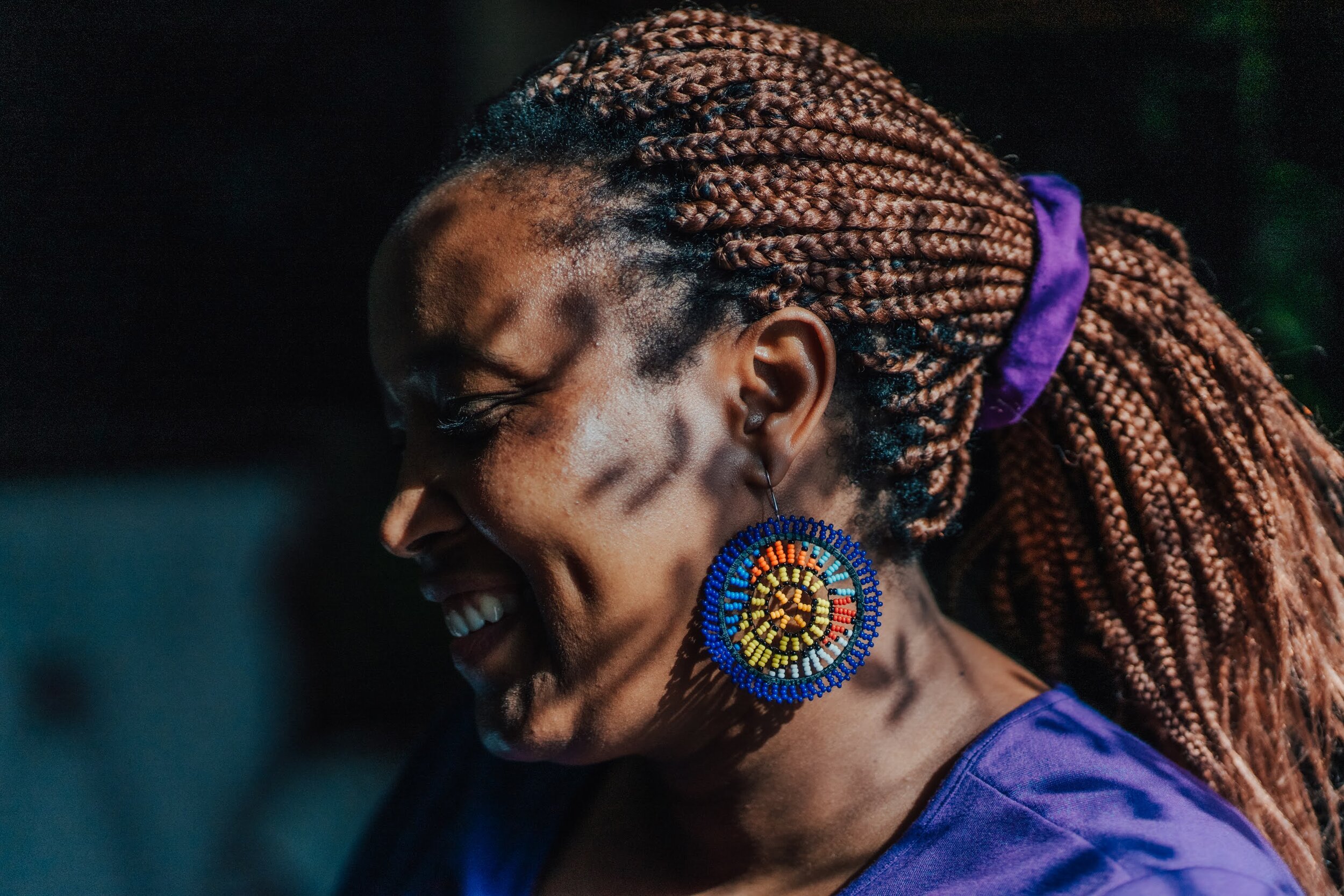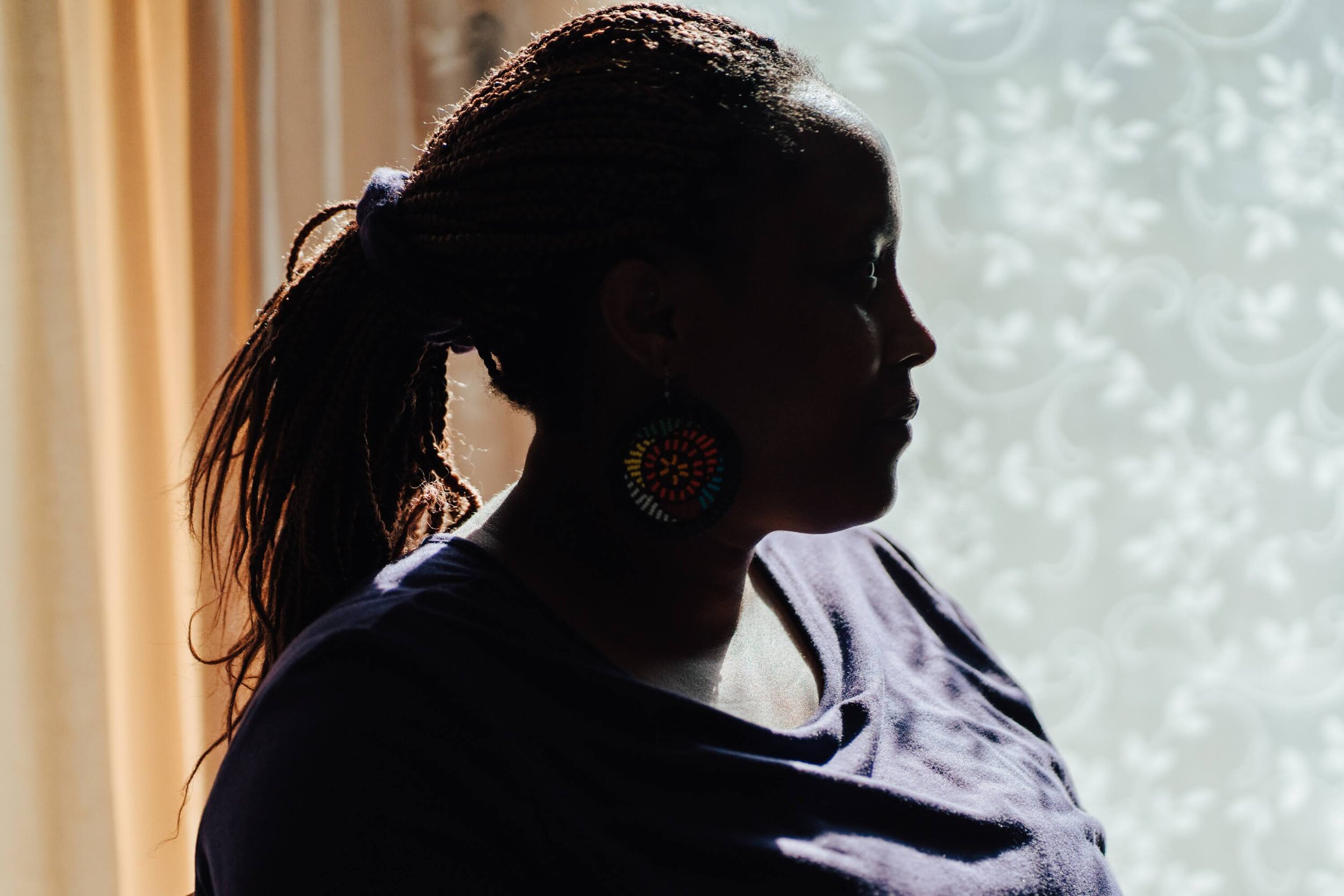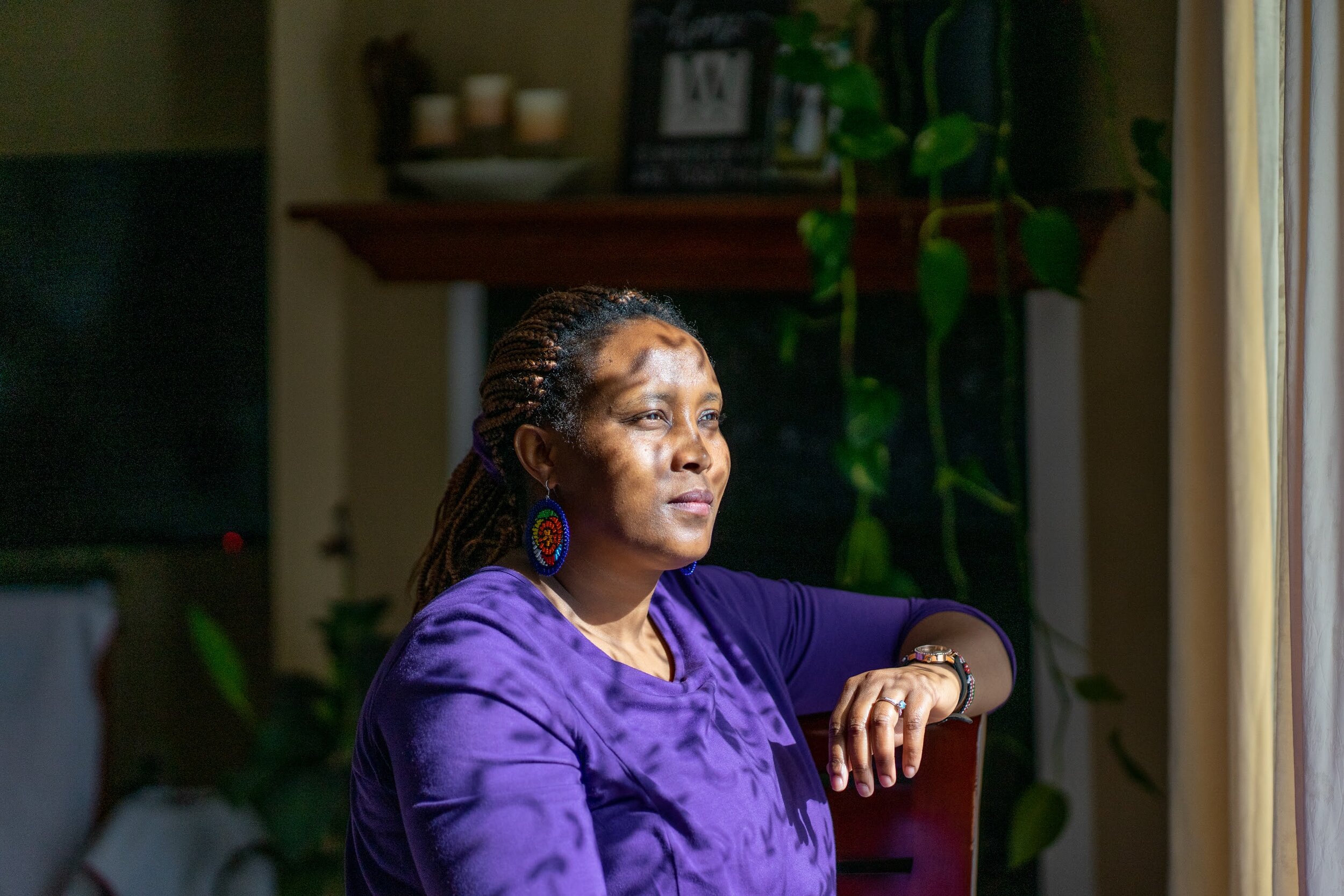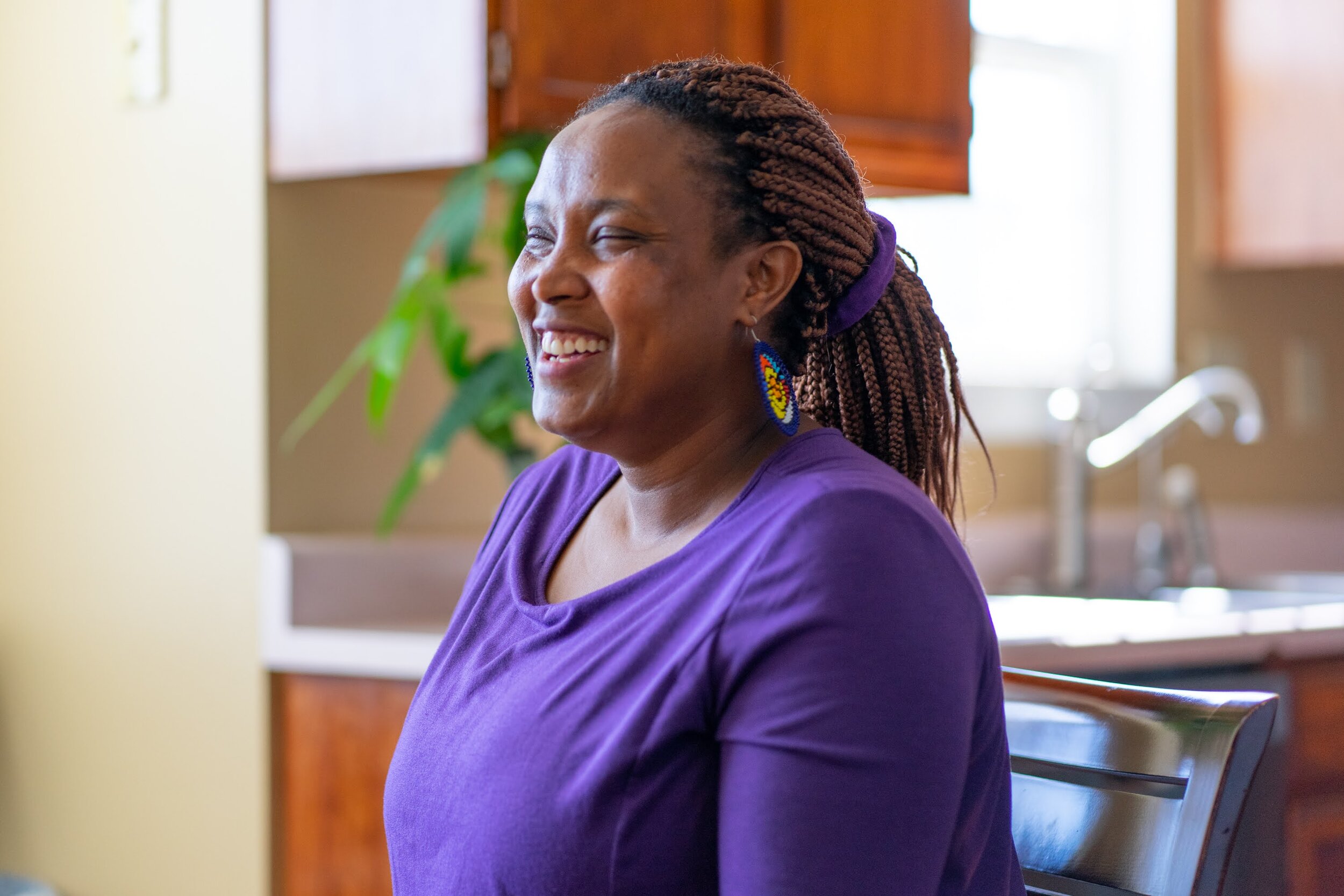Home Away from Home: Beatrice Mungai Wangugi
Skeptical about Facebook romances? Not if you’re Beatrice, the Black lady from Kenya.
You will understand later why this is relevant. For now, let me walk you through Beatrice’s world. She and her husband own Stop N Go, a popular convenience store in Clifton. She divides her time between managing the store, completing her nursing degree, and working as a state tested nursing assistant.
Beatrice is hard to describe. She’s hard to describe because of how she draws you into her space. When I interview someone, I usually have a set of questions that I want to ask. The usual, who are you, what makes you tick, where are you from, when did you come to the United States? Why and how? In the process, I’m aware that people are guarded. It’s an online publication after all, and I’m asking them to share their life story. It’s wise to be guarded.
I asked Beatrice the same questions, but I found myself concentrating on the soft sound of her melodic voice while observing her gestures. So different from mine. As she talks, she sweeps her hands back and forth, left to right and in and out as if conducting the sound of her own voice. She has soft dimples on her cheeks, and she talks, there’s an ever-present smile on her face. That’s what beautiful must be.
I went back to the interview, this time, with my attention in check.
Interview by Clara Matonhodze Strode. Photography by Emily Palm.
Beatrice, thank you for doing this interview with me. Can you tell me who we are meeting today?
You are meeting Beatrice Mungai Wangugi. Mungai is my family name, and Wangugi is my husband’s family name. I grew up in Kikuyu, a small town in Kenya.
I’m familiar with Kikuyu through reading Ngũgĩ wa Thiong'o’s novels. What is it like growing up in what seems like an enchanting place?
Growing up was fun. We did a lot of farming. You had to farm for your food, so I started working on the family farm – a real responsibility at a tender age. I have a brother and a sister. I am the only one here in the U.S. I went to school in a nearby village where I would walk four miles back and forth. I was happy when high school came because I went to Nakuru. I was so tired of walking.
Was it a boarding school?
Yes, it was. The walking ended; I was so happy to go there. Nakuru is a good place. It was the first time I went out of the village. It was a cold place, though. I remember I always had to have an extra blanket because of Lake Nakuru and the Great Rift Valley – the weather was just so different. It was a challenge, but it was also lovely. Lake Nakuru is filled with beautiful flamingos, and the crater is gorgeous too. Nakuru was beautiful. It was a tourist destination, and we would hear the volcano roar all the time. I was glad I got to see all those things during geography. It was also the first time I met people from different cultures, and it was so enlightening. I learned diversity in Nakuru and started seeing things differently.
What did you do after high school?
After high school, I wanted to do nursing because of the big hospital in Nakuru. I used to see the nursing students all the time, and that inspired me. However, my parents had other ideas. They were like, we only take you as far as high school. We have done our best. After that, it’s on you. My mom is not educated, so she thought being in high school was the top for her. Now I could get a job. It was hard for me because I realized if I was going to achieve my dream, I would have to do it on my own. I started doing jobs like being a cashier and domestic work, and I saved.
After about two years, I had saved some money. When I went to the college to enroll, they told me it was not enough. At the time, I was working as domestic help, and when I told the lady I was working for, she said, “Work some more. I will keep your money so you can save it.”
Oh my! Did you trust her?
I did. She saved that money and later met a friend of hers who told me that nursing school is very expensive, and I would never save enough, but I could start a nursing assistant training. Do you know, the lady I was working for, she let me stay at her home while I was going to school. She drove me to school and helped me enroll. I did not have to pay her anything. She just let me stay there, and I was packing my own lunch, and she never asked me for money for it. Because I was going to school, she had to look for someone else to work. She was always helping me. I would work during the weekends with the other girl, but I was just staying there otherwise. She really helped me. That’s how I finished that course and started to work in a hospital.
That lady was your angel – how did you do at the hospital?
I did very well in that course. I was happy to work in the hospital. They liked me and said I did a very good job. I was happy there because even though I was not a nurse, it was a starting point for me. I would continue later with nursing, and the hospital had told me to come and work later after I was done.
When the new year rang in, my prayer to God was that I was so happy I had a passport and wanted to use it before it expired.
When did you come to the U.S.? How was the journey for you?
I came in 2018. In high school, when I went to Nakuru, there were girls there who were so focused on what they were doing because they were headed abroad after high school. They had all these glossy magazines like Vogue, Pose, and others to see and wonder at life abroad. The people were so different, and I did not understand how these girls were so focused on that. I would ask them questions about it, and they would change their minds about where they were going. It would be England, next time it would be Italy, and so I just was confused. I used to admire them because I just thought I would never survive. However, it never left my mind.
During my time working as the help with this lady, I learned their son went to America, and at one point, they went to America. I was amazed. I was eager to know what their experience was.
Did you ask them? What did they say?
Yes, I did. They said they had gone to California and America was full of apples.
Did they tell you anything else about America?
No – they just said it was evergreen, so beautiful and full of apples everywhere. I had the impression it was like Canaan, the land of milk and honey. It made me even more convinced that this was not for me. It was another world beyond my imagination.
At what point did coming to America become a reality for you? What happened?
In 2008, I had a friend who had been in America for five years. I talked with him more, and he told me things that started to make it possible for me to see that I could travel to other places. I got a passport, but I had no destination. My passport was valid until 2023, so I just made a mental note. When I was in line to get it, someone asked me where I was going; I said I didn’t know. The person was renewing theirs, and this amazed me. She lived in Tanzania, and we talked that maybe I can use it to visit her. I had until 2023 to use it, and now I just needed to be invited somewhere.
When the new year rang in, my prayer to God was that I was so happy I had a passport and wanted to use it before it expired. Nothing happened that whole year. The following year was the same, and then in 2015, I bought a smartphone and opened a Facebook account. I connected with someone I knew in my village. That person was Joseph.
Facebook romance? Modern love?
Yes! But he was in Cincinnati. We started talking and continued talking. At some point, he told me that he was coming to Kenya and asked if he was going to be able to see me. I said yes.
We had a good time when he came, and at some point, he asked me if I was willing to come to America. I was elated, thinking this is what I was waiting for! The opportunity for someone to invite, so I said yes!
Unfortunately, the U.S. embassy denied me a Visa because I had never traveled anywhere. It was a huge disappointment! It reinforced my previous belief that this was not meant for me. Joseph said not to worry much because he was retiring and would come back to Kenya. However, it wasn’t so easy, and in the end, we decided we would get married, and that way, I could finally come. The process took two years. That was my coming to America! Everybody in my family was in denial. They did not understand why I wanted to go, and my mom was distraught. I was happy, but it was a difficult situation for my family.
Landing in America, what were your thoughts? How were you feeling?
It was my first time flying. It was perplexing. The journey had been filled with trepidation and fear of getting lost. I had initially landed at Charles De Gaulle Airport [in Paris] en route to Cincinnati. The airport was huge and busy and beautiful. When we were flying, I kept feeling like the plane was not moving, but my eyes were fixated on the inflight G.P.S., and I could see we were progressing.
As the plane started to land in Cincinnati I thought something was wrong. It was in April, and there were no leaves on the trees. I wondered what had happened to this country? It was so dry. Or maybe I was in another country? But then I saw the American flag and felt better.
I had expected something like De Gaulle, but it was small, and there was nobody. I thought I was lost, but it did say, “Cincinnati.” I liked that it was clear where I needed to go. I liked that it did not feel very overwhelmed, and it seemed the people expected me and knew I had something to give them because they asked for the envelope that the U.S. embassy in Kenya had given me.
As we drove from the airport, I remember being confused by the place. The trees were dry, and nothing was green. It was cold. This was far from the America I had imagined full apples and greenery, the land of Canaan, but Joseph assured me that the trees were not dead and they would come back in spring. It was difficult for me to understand.
That was two years ago. How have you adjusted?
It’s still going on, but I am a quick learner and determined. I am doing the nursing program at the University of Cincinnati, and I help Joseph in our store as much as I can. Even though the store keeps us busy, and I can probably just do that, I still have my own goal and determination to be a nurse. It’s my calling.
I am learning new things here. I have realized who I am. Something happened when I was starting to work at a previous job. I had just started, and I overheard someone tell a coworker that there was new person they were working with, and it was a Black lady. I did not realize they were talking about me. I was expecting to see someone Black – and then later, I realized I was the Black lady they were referring to. I went into a room and looked at the mirror. It had never come to my mind that this is me. That face in the mirror is me.
I am a go-getter, and I get what I want. I am determined to be Beatrice, the Black lady from Kenya.
We have similar experiences in that way. I wrote an article about realizing that I was Black.
Yes, because back home, people don’t call others by the color of their skin. We would say a lady from Kenya, or this and that village. Now I realize that I am a lady, and I am Black. It has never come to my mind that Black is to describe a person. That’s how I came to understand how people will be seeing me in America. I don’t have to tell them that I’m Kenyan; they just see that I’m a Black lady.
How did that realization make you feel? What’s the emotion behind that realization?
It’s an eye-opener. It’s not a negative thing. I just did not think about it before, and now I have to. When I go back home, I will be like, you know mom, I’m Black. I’m a Black lady. My mom will think America has done something to me. It was always in me, but I just did not realize it. I did not think about it. It’s part of me. My mind changed with that understanding. I did not work for more than three months at that job because no one ever asked for me using my name. No one asked about Beatrice. They asked about that Black lady. I could not digest that, so I quit. I’m not only Black. I’m from Africa, and I have a lot of dignity. Just referring to me as Black was not acceptable. I could not survive where I had to constantly explain my existence.
I also realized that I wanted some history here. I want to travel across the U.S. to say I have been here and interacted with people. I get that on a small scale at U.C. and working at the store, but I need more.
What other challenges have you faced?
Social life is difficult. From an environment in Kenya where I cook for a lot of people and extras because you are guaranteed someone will pass through to here where I only cook for three people. It’s lonely. Everyone is busy, and even my son has his own life, and children live on their own. It is just a lot of adjusting to. With us, you stay at your parents’ home until you get married. Even church services are over after only 2 hours.
I remember someone at school saying there was no God. I asked them why they believed that and in turn they asked me why I believed there was God. I had never thought about it. I feared what my mother would say if she were to find out.
And then there is the neighborhood challenge where people don’t tell kids to stop what they are doing – instead they call the police.
Beatrice, through all this, what helps you cope? I ask all the women I interview this same question. What did you bring with you that you hold onto in times of strife? An ordinary thing that has taken extraordinary power in comforting you.
It’s all these materials that decorate my home. I got them a year ago. Before I got them, I would come home, and this home did not feel like home to me. They made me so happy when I got them. Now, I come home, and it feels like home. I sit down, and it just comforts me. My husband and kid do not like them, but they don’t know how comforting it is for me. I feel like I am home. Even my sister admonishes me for them, but they make me feel happy.
What would you like the women of Cincinnati to know about you?
Family is very important to me. I was raised within a family, and I value that. I am also very ambitious. I might not look like it because I struggle with English and am an immigrant, but I am very ambitious and plan to accomplish my dreams. Everyone thinks that I am very innocent. I am a go-getter, and I get what I want. I am determined to be Beatrice, the Black lady from Kenya.
“Home Away from Home” is Clara Matonhodze Strode’s monthly column celebrating immigrant women who now call Cincinnati home.
Women of Cincy is a certified 501(c)3. This belongs to you. Consider supporting future stories with a donation.







